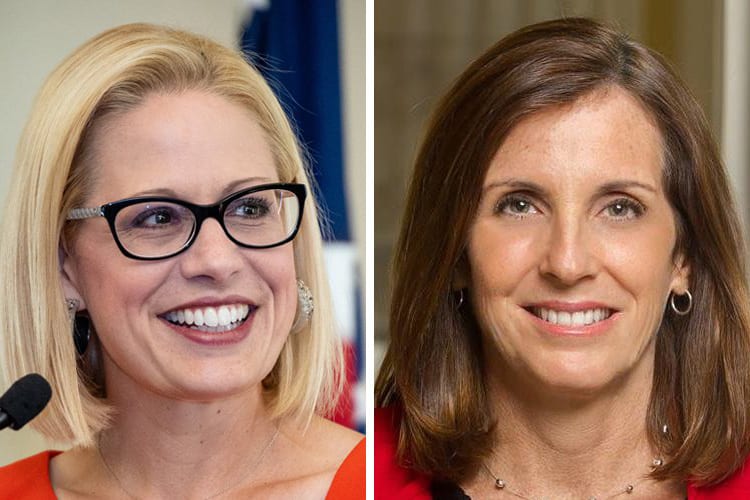The race to replace Sen. Jeff Flake, R-Arizona, is shaping up to be one of the most expensive Senate races in state history, with the two leading candidates reporting a total of $28.6 million raised through the end of September.
Federal Election Commission reports released last week showed that Democratic nominee Kyrsten Sinema had raised just over $16 million by Sept. 30 and Republican nominee Martha McSally reported raising $12.6 million.
With just weeks until Election Day, the FEC said Sinema still had $2.1 million in the bank to McSally’s $3.3 million in a race that many are calling a toss-up.
Those figures do not include millions in spending by outside groups, an amount that the Center for Responsive Politics said had already topped $33 million for the race as of last week.
“The fact that these Senate candidates have gotten to this level is shocking and speaks to the stakes, both in the state, and for the country, in terms of this particular race,” said Jason Rose, a Scottsdale political consultant.
“However, I think it also speaks to what are arguably the two best candidates in the country, that happen to be facing off against each other in Arizona,” he said. “Kyrsten Sinema and Martha McSally are as good as it gets.”
Leah Askarinam, a reporter and analyst for Inside Elections, said the two women have both “been strong fundraisers and they’ll both have the resources that they need” in the final push of the campaign.
“This year has been interesting because it’s been re-writing the rules about fundraising and really upping expectations for candidates across the board,” she said, although Democrats have had an advantage there nationally.
RealClear Politics’ national poll average showed McSally and Sinema in a virtual dead heat as of Saturday, with McSally getting 46 percent of the likely vote to Sinema’s 45.3 percent.
“It’s definitely one of the closest races in the country,” Askarinam said. “What you’re seeing right now is McSally trying to activate the Trump Republican base, and kind of hoping that the extra boost in enthusiasm will push her over the edge, especially in a state that Donald Trump carried in 2016.”
Bill Scheel, a political consultant and partner at Javelina in Phoenix, said that the tight polls are “a testament to the type of race that Sinema has run and some of the challenges that McSally has had in really creating her own identity.”
“A Democrat in Arizona being in that position two-and-a-half weeks before the election is kind of unprecedented,” Scheel said. “Clearly, Arizona is going to be a purple state and this Senate race is going to confirm that.”
But Sinema did not have to face the bruising primary that McSally had to endure, when she beat back high-profile challenges from former state Sen. Kelli Ward and former Maricopa County Sheriff Joe Arpaio.
“McSally came in with a bit of a disadvantage in that she had a primary that she had to focus on and Sinema did not,” Askarinam said. “So, McSally couldn’t immediately respond to some of the criticism.
“Sinema was basically able to define herself without facing too many attacks while the Republican primary was taking place,” she said.
Since then, however, Rose said Republicans have “seen her (McSally) in action, they are incredibly impressed, and should be.”
“The enthusiasm gap has just narrowed since the Kavanaugh hearings, in terms of donations, in terms of hustle, in terms of all things involved in a campaign,” he said. “There’s a lot more lift with Republicans right now than there was before.”
But a Sinema campaign memo said McSally’s campaign “is on the defensive and in disarray,” and pointed to support from national groups. McSally’s campaign did not return repeated requests for comment.
Brendan Quinn, outreach manager at the Center for Responsive Politics, said that outside conservative groups have spent more than liberal groups on the race. The center’s website, OpenSecrets.org, shows that $18.6 million was spent in support of McSally or opposing Sinema so far, while $16.5 million was spent on behalf of Sinema – though Quinn cautions that some of the anti-McSally funds came during her primary.
Rose said that despite concerns “that dark, dirty money can overtake candidates and just leave them as pawns in the machine,” both candidates are holding their own with direct fundraising.
“What Sinema and McSally are showing is that, yes, there’s still that independent dark, dirty money out there, but they have sufficient resources to advocate for themselves,” he said.
As for direct fundraising, Quinn said both campaigns have gotten “a little bit more money from out of state than in state, which is not surprising in a nationalized election like this one.”
Rose noted that the “stakes are unusual, in that you may have the control of the United States Senate in the balance,” but said the hard-fought campaigns are nothing new to the state.
“Arizona is no stranger to close, high-profile elections,” Rose said. “This is another race that is on a razor’s edge.”
Story by BRENDAN CAMPBELL, Cronkite News




